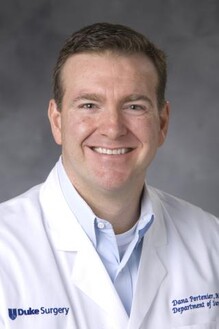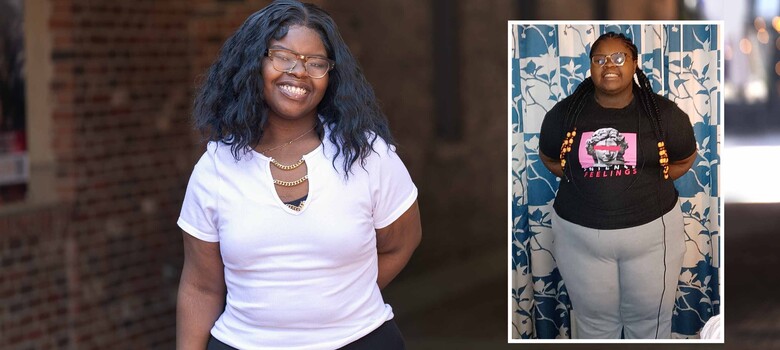Weight Loss Surgery Puts Teen on Track to Pursue Career Goals

High school senior Fernando Morazán stands near his home in Durham, NC.
Fernando Morazán of Durham was five years old when he was first diagnosed with obesity. He started working with Duke Children’s Healthy Lifestyles program to learn healthy behaviors and lifestyle habits, but Fernando continued to gain weight. By age 10, he had high cholesterol and high blood pressure. By the age of 16, Fernando weighed 289 pounds. “I thought this was how I was going to live my life,” he said. Then Fernando had weight loss surgery. Now, the high school senior “can do stuff I could never do when I was overweight.”
The Role of Genetics in Obesity
According to Katherine Caro, PA-C, a physician assistant with the Duke Children’s Healthy Lifestyles program, healthy behaviors and lifestyles are core components of the comprehensive program’s approach to obesity treatment. However, treating obesity isn’t “as simple as moving more and eating less,” she explained. Research shows that 40 to 70 percent of body weight is influenced by one’s genetic makeup. “Sometimes families do everything right, but their genetics is such that they are predisposed to have extra weight,” she said.
Fernando and his family experienced that frustration. Over the years, Caro watched them work hard. “They were consistent and diligent but could not achieve durable weight loss,” she said. Weight loss medications also didn’t work. Fernando lost some weight but couldn’t maintain it. “We started talking about bariatric surgery when he was 16.”
Qualifying for Bariatric Surgery
At the time, Fernando weighed 289 pounds. “Fernando has big dreams,” Caro said. “We considered his BMI [body mass index], his health conditions, his quality of life, and how his weight was impacting his future. He qualified.”
Duke Children’s is accredited by the Metabolic and Bariatric Surgery Association Quality Improvement Program (MBSAQIP) to perform weight loss surgery in children 14 and older in North Carolina. This accreditation reassures parents that the Duke program provides safe and effective care, and has the resources to help Fernando and other teens prepare for the procedure and life after.
In addition to bariatric surgeons and pediatric obesity experts, the comprehensive weight loss team includes registered dieticians, mental health counselors, physical therapists, and occupational therapists. “We aim to make obesity treatment equitable and accessible,” Caro said. “We talk to families about their values. We focus on their health and their family support system. We choose the best treatment plan for the family.”
Fernando was scared when bariatric surgery was recommended. “I was doubting it, but my mom said, ‘This is going to change your life.’” Fernando listened. In October 2023, Dana Portenier, MD, a Duke bariatric surgeon, removed up to 80% of Fernando’s stomach. The gastric sleeve procedure restricts how much Fernando can eat and drink. It also suppresses the hormones that affect appetite. The combination results in significant weight loss.
One-Year Goals Already Met
One year after surgery, Fernando has lost about 80 pounds. The process wasn’t easy. He had to learn how to nourish his new body. But now “I can do more activities without being fatigued fast,” he said. “My clothes fit well.”
According to Caro, “he’s already reached our target goal of losing 20% to 30% of total weight loss by one year.” His blood pressure, cholesterol, and liver enzymes are normal. “That is exactly why we recommended the surgery,” she said. “We see the complete resolution of the health issues that come from obesity.”
Fernando will continue to work with Caro and the Healthy Lifestyles team until he’s 25. “Once our children have surgery, we check in with them as frequently as they like,” Caro said. “This is a lifelong, chronic disease. While bariatric surgery helps resolve some conditions, we want to be sure there is no recurrence.”
Planning for a Future as a Doctor
Fernando said the experience has given him the confidence to pursue his goals. “When I was overweight, I didn’t have any hope. Now that I went through the surgery, if there’s the tiniest goal, I say, ‘Yes, I can reach that.’ My whole mindset has changed.”
Fernando is now planning his future. “Ever since I can remember, I wanted to be a doctor." After going through this procedure, "I know I can impact a community that has been in the same shoes as me.”




